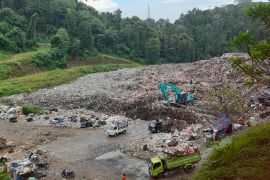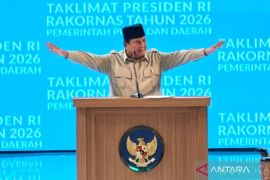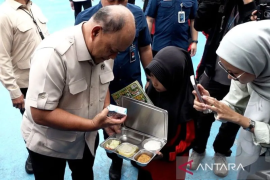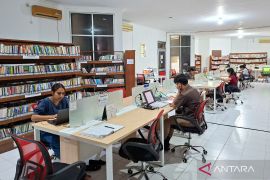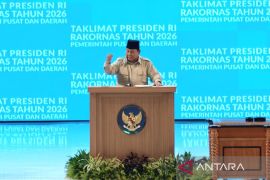The presence of the trash bank is part of the Ministry of Environment`s target to develop at least 25 trash banks in each of 250 cities across Indonesia by 2014.Jakarta (ANTARA News) - Garbage which is sorted and managed properly and then saved in a trash bank can become a source of public income.
The Indonesian Environment Ministry`s program of trash banks in the beginning was to overcome trash problem and to increase public awareness of waste management, but now it also provides great economic benefits to the society.
"Trash management does not only make a city clean and beautiful but it also improves the economy of the people as has been expected by the government," Environment Ministry`s Waste Management Deputy Assistant Sudirman said in Probolinggo, East Java, on Sunday.
Initiated by the Ministry of Environment, the trash bank program was considered an effective concept to overcome trash problems and create a cleaner, healthier, and more comfortable environment.
The presence of the trash bank is part of the Ministry of Environment`s target to develop at least 25 trash banks in each of 250 cities across Indonesia by 2014.
Sudirman said the Ministry has recorded a turnover of Rp15.7 billion per month from all existing trash banks in the country.
As of December 2012 there were 1,136 trash banks in 55 districts and cities, involving around 29,203 workers but now the number has increased significantly.
"Now there are a total of 1,195 trash banks in 58 districts and cities with 106,000 workers that produce Rp15.7 billion per month," Sudirman noted.
"Therefore, he called on the people to save the trash in the trash banks to produce money to pay their electricity and telephone bills," he went on.
According to him, a trash bank was a garbage management technique by adopting a banking management, but the instrument of transaction was garbage, not money.
Due to a lucrative additional income from trash management, Sudirman invited all people to actively manage the trash problem properly in order to reduce greenhouse gas emissions.
He said the presence of trash banks was first initiated by the people of Bantul district in Yogyakarta and now it has been developed and applied in various parts of the country.
The trash bank initiator in Yogyakarta was Bambang Suwerda who had said the garbage bank existence could also change the social status of scavengers who roamed the garbage heaps to pick out inorganic waste.
Bambang said the scavengers who brave the heat to comb through the mountains of trash for anything salable virtually contributed to solve the waste problem.
He also said that through the trash bank development program, the scavengers would have clear access to work with waste collectors and waste receptacles in a number of factories.
Following his initiative to introduce the trash bank to the people of Bantul District, Bambang was granted a Greenovation Award by the Agency for Assessment and Application of Technology (BPPT) in November 2011.
He said the granting of the Greenovation Award 2011 was for the success of "Gemah Ripah Trash Bank" to civilize and propagate the spirit of environmentally-friendly trash management among the local community.
Trash bank as part of efforts to overcome ubiquitous problem in Indonesia is also able to empower the people`s economy at grassroots level.
Trash is actually a ubiquitous problem in Indonesia as the people either burn their garbage in front of their houses or simply throw it into the rivers, for they have lack of methodical way to deal with it.
Consequently, riverbanks in urban as well as rural areas are plagued with massive pile-ups of plastic bottles, empty bags of chips and various types of large and small trash.
Therefore, the Ministry of Environment has launched a trash bank development program in a bid to raise the circulation of people`s economic value and to reduce the trash problem.
But the Environmental Affairs Minister Balthasar Kambuaya said in Surabaya, East Java, in March 2013 that trash bank has not yet spread evenly in the country.
Therefore, he has encouraged all regional administrations to establish trash banks to overcome garbage problems besides increasing the people`s additional income.
"If the trash is properly managed, the volume could be reduced up to 50 percent. Besides, it could also increase the income of local people," the minister said.
The environmental affairs minister has noted that one person could produce 2 kg of garbage per day, and if he or she managed it properly, it could turn into a source of income.
He said trash banks held great potential for both city and provincial governments and therefore, all cities and districts in every province should have them.
The minister pointed out that the presence of a trash banks would help improve the local people`s economy because those who have the capability to value trash and sort it according to type and sell it to the banks would have an additional income.
According to Bremen-based Overseas Research and Development Association (BORDA) in Germany, more than 22.5 million tons of garbage are generated in Indonesia every year, and by 2020 Indonesians are expected to throw away 53.7 million tons of waste.
BORDA, a close observer of local government capacity in solid waste management, sees basic problems in Indonesian cities, such as a lack of logistics and equipment to get garbage out of neighborhoods.
But the trash bank development program is expected to reduce the problem and raise the circulation of people`s economic value. (*)
Reporter: Otniel Tamindael
Editor: Heru Purwanto
Copyright © ANTARA 2013
